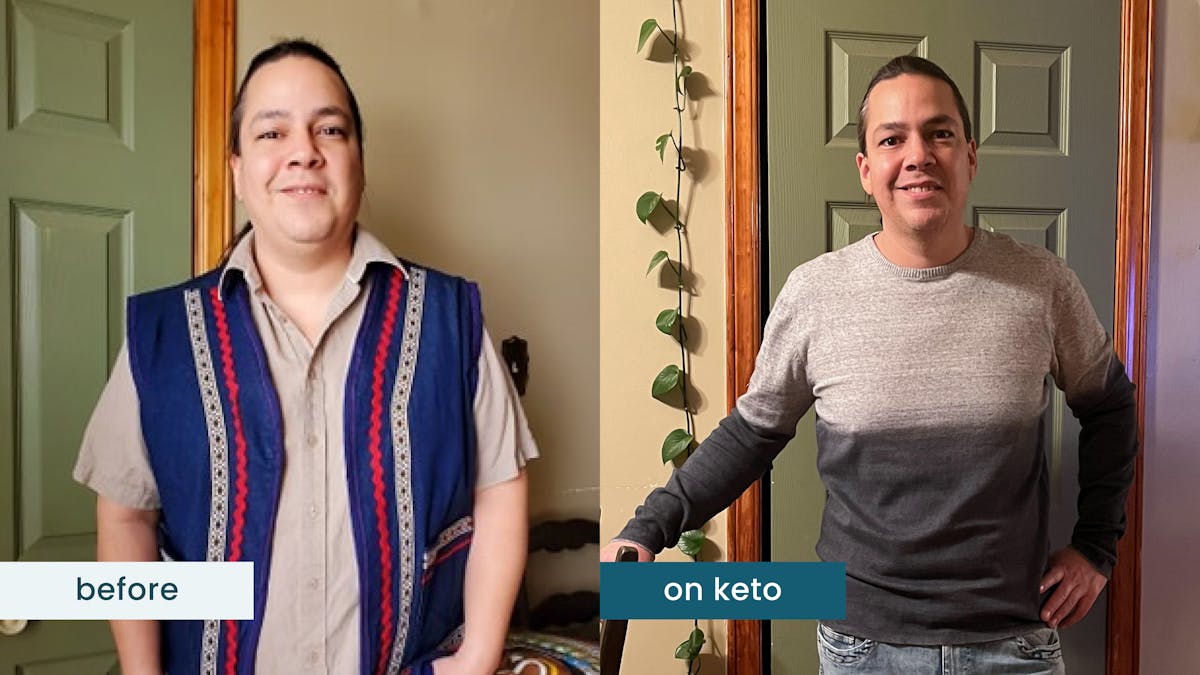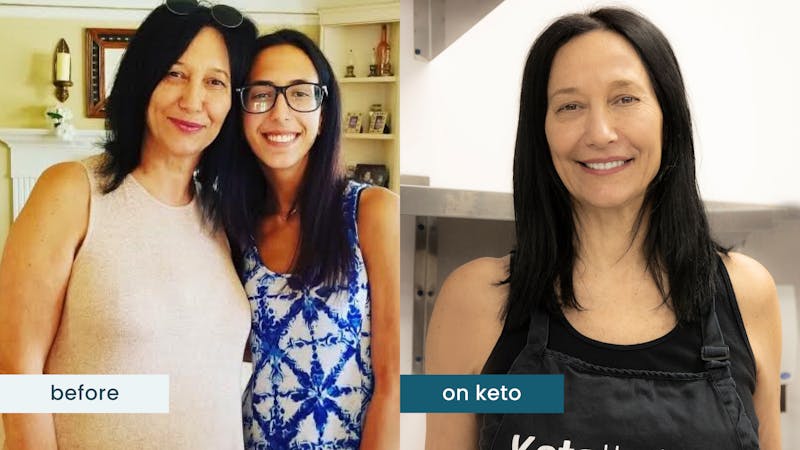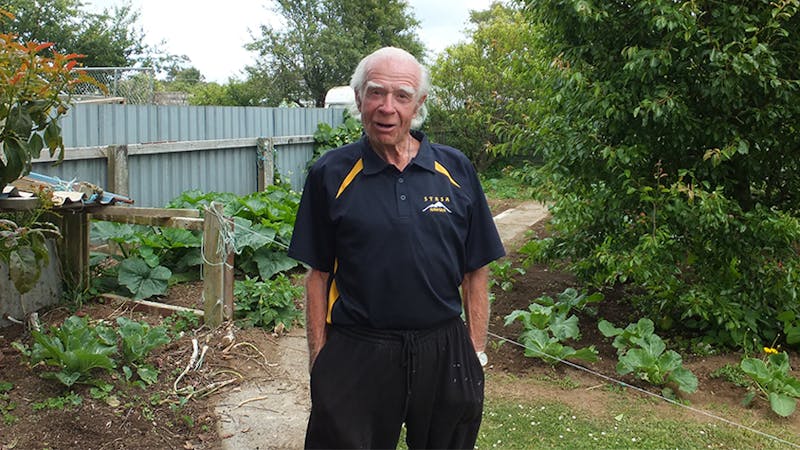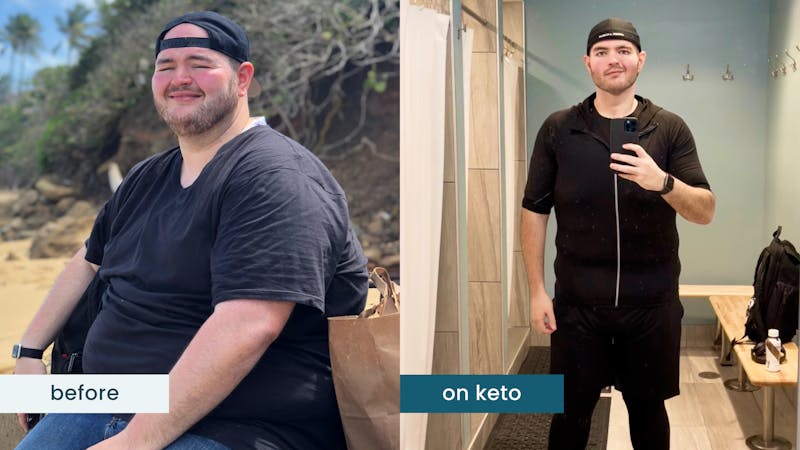Tshakapesh took charge of his health

Meet Tshakapesh, a.k.a Tshak, whose heritage is half Quebecois (French Canadian) and half Innu, an Indigenous people from Northeastern Quebec.
Tshak knew he was gaining weight and that his Indigenous heritage put him at higher risk for diabetes and obesity.
He decided in August 2021 to try keto eating combined with intermittent fasting. Within just five months he lost 52 pounds (24 kilos) and improved his health and energy.
“When you understand why sugar, junk food, white flour, and other processed additives are harmful, it’s easier to rule them out,” he says.
Tshak’s story has been translated from French, and lightly edited for length and clarity.
What’s your name, age, and where do you live?
I am Tshakapesh, (Tshak), I’m 45, and I live in St-Robert, a small rural municipality about 100 km northwest of Montreal, Quebec.
When and why did you start eating a keto diet?
I started the keto diet with intermittent fasting in August 2021 because I wanted to lose weight and avoid the health problems that are common among my people. I am half Quebecois and half Innu, the Indigenous people from Northeastern Quebec and Labrador in Canada.
When I started, I weighed 225 pounds (102 kilos) and had a BMI of 32, which is considered obese. I was too heavy for my size. I was also having kidney issues, mostly painful kidney stones.
I did not like my image or my body, and I was looking for a way to lose weight and be more healthy.
Tell us more about your Innu heritage and the role of diet in Innu health
My mother’s community is the Uashat-Maliotenam (Reserve 27A), located on what is called the Quebec North Shore on the Gulf of St. Lawrence. You can find out more about our Innu Nation here.
For millennia we were nomadic hunter-gathers all across the Northeastern part of Quebec, until the arrival of the Europeans. Now we no longer eat our traditional diet that was rich in caribou, game, and fish, but instead eat a lot of flour, sugar, and potatoes.
Since colonization, there is a lot of metabolic disease in our Innu nation, particularly obesity and diabetes. Diabetes among Indigenous people in Canada is as much as nine times higher than the rest of the Canadian population. Type 2 diabetes is a very significant problem in my mother’s community.
A staple in our diet is “bannock” (banique in French) which is a biscuit of white flour, fat, water, and salt. Sometimes it has sugar or baking powder. We eat it at practically every meal.
Up until recently I actually thought that bannock was a traditional Indigenous food, but I have since learned it was a “gift” to Indigenous people from early colonizers. In my mind, it was a gift of poison.
What were you typically eating before starting keto?
I ate a lot of 9-grain bread with organic peanut butter or sometimes with cream cheese or a Quebecois meat spread called “creton” (basically ground pork and fat with onions and spices.)
For breakfast, I would have cereal and milk. I ate (and I still eat) a lot of local beef, pork, chicken.
My meals of meat were often accompanied by potatoes or rice. I often ate small sweet yogurts, granola bars, and potato chips. If I had a dessert I had a tendency to eat too much.
I really liked licorice and caramels, which I would nibble in the evening. In the evening I also overconsumed beer.
What do you eat now?
I have cut out all refined sugar, potatoes, rice, bread, pasta. I have cut out all processed, industrial foods. I no longer drink high-carb beer but occasionally will have a low-carb beer.
I now eat a lot of broccoli, cauliflower, salads, avocados. I also have added top-quality olive oil and plain local (Buffalo milk) yogurt. Hemp seeds and chia seeds are now part of my diet.
When I am not fasting, I eat once or twice a day. I often start with 50 to 60 grams (about 2 ounces) of mixed nuts.
I eat more eggs and bacon than before. As I mentioned, I am still eating local beef, pork, and chicken.
I have whipping cream in my coffee.
I often do intermittent fasting, sometimes for a few days. The longest fast has been five days. I find it amazing that I do not find this hard.
I am currently on hour 75 of a planned 120-hour (5-day) fast. And I feel fantastic.
How has your health and weight improved?
In five months, I lost 52 pounds. My weight is now stable. I am really proud that I now weigh 173 pounds (78 kilos).
I feel much better. I have more energy and I sleep much better. I am starting to increase my physical activity because I feel so much better.
What Diet Doctor resources have you used?
The resources that I used the most were the videos with Dr. Bret Scher. I love him. He is very sympathetic. I also use DD’s food guides for the net carb calculations.
I also have been helped by the writings of Canadian doctors who are featured on the Diet Doctor site: Dr. Èvelyne Bordua-Roy, who wrote a popular book on the keto diet and fasting in French (Le grand livre du jeûne; or The Big Book of Fasting), and Dr. Jason Fung, who wrote The Obesity Code and talks often of fasting, such as his Diet Doctor fasting video course.
What three tips do you have for people starting out?
My three pieces of advice are
- Get informed. Diet Doctor is great for this. When you understand why sugar, junk food, white flour, and other additives are harmful, it’s easier to rule them out.
- Try intermittent fasting. It is terrifying for many but once tamed it is a powerful tool for weight loss and feeling great.
- Know where your food comes from and how it was raised. Eat local and preferably organic.
Final thoughts?
I want to thank Diet Doctor for all that you do. Everyone should know that keto is not a diet, it is a healthy lifestyle that many of us evolved to eat. I am convinced that keto with fasting periods was the normal diet of my Indigenous ancestors. It helped them survive and thrive.
And now, for me, it will be a permanent, healthy, and satisfying way to eat.
We eat to satiety and savor the taste of our food. All our health and senses improve.
Thank you, Tshakapesh, for sharing your experience and explaining your Innu heritage as it relates to diet, health, and disease.
Cutting out all processed, high-carb foods like sugar, flour, bread, cereal, potatoes, and rice will go a long way to improving your health.
While Diet Doctor endorses intermittent fasting regimens, we do caution people doing fasts for more than 36 hours. We recommend consulting your doctor before attempting a multi-day fast. When doing a multi-day fast, stop if at any time you feel sick.
For others who may be interested, before attempting an extended fast, please read our in-depth guide on the pros and cons of longer fasts, how to do them safely, and who should not attempt them.
~ Anne Mullens
‘Keto is the only diet I’ve ever been excited to do’
Share your story
Want to share YOUR success story with Diet Doctor? Send an email to success@dietdoctor.com. Feel free to use the questions on this page as a starting point.
Share your story

